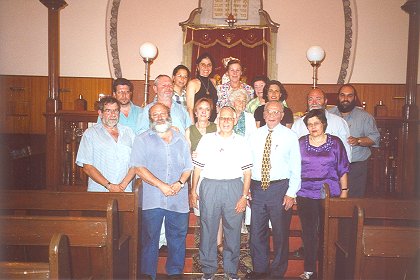|
Small
congregation fights valiant fight
The Windhoek Hebrew Congregation, now numbering around forty-five souls, comprises the great majority of Jews still living in Namibia. About a dozen Jews remain in the towns outside Windhoek or on the diamond mines further north. At its height in the 1960s, there were about 120 Jewish families in what was then South West Africa, with active communities not only in Windhoek, the capital, but also in Luderitz Bay, Swakopmund and Keetmanshoop. Its members were prominently represented in all the professions and business. Three Jews served a term as mayor and in 1961 S Frank was elected unopposed to Parliament - as a National Party MP. From the mid-1970s, the community declined steadily, in part as a result of the instability occasioned by the country's war of independence against South African occupation from the late 1960s until 1989. Given the intertwined history of South Africa and South West Africa from 1915 until 1989, when the latter effectively constituted a fifth South African province, Nambian Jewry most closely resembles a typical South African country community and was dealt with on that basis by the SAJBD's Country Communities Department in the pre-independence years. Rabbi Moshe Silberhaft, who is Spiritual Leader to the African Jewish Congress as well as to the South African country communities, pays regular pastoral visits to Windhoek and oversees the maintenance of the Jewish cemeteries in other parts of the country. Despite diminishing numbers, the Windhoek congregation still holds regular Friday night, as well as Yom Tov services. High Holiday services are held through the assistance of volunteers from Johannesburg. Namibian-born and bred Zvi Gorelick and Yinon Levy, a pilot for a local airline, assist on a volunteer basis in overseeing the communities spiritual needs, including leading services and officiating at funerals, and also assist with the education of the remaining children. The oldest member of the congregation, Honorary Vice President Harold Pupkewitz, has been attending the shul for all but six months of its 80-year existence. Pupkewitz was nine years old when he arrived in Windhoek from Vilna on 1 March 1925. Also making their homes in the still largely undeveloped new land were his elder brother Morris (who passed away four years ago) and younger brother Julius, who also still lives in Windhoek. Pupkewitz, a prominent Namibian businessman and a Vice Chairman of the African Jewish Congress, expressed disappointment that thus far, despite Windhoek's many attractions as a vibrant, modern African city, few Jews had decided to move there in the post-independence era. Apart from the pleasant climate and multiple business opportunities, he pointed out that there was virtually no anti-Semitism in the country. There were still a dwindling number of ageing Nazi sympathizers, whose presence could be explained by the fact that Namibia was once a German colony, but these had long ceased to pose any kind of threat to the Jewish community. About ten years ago Pupkewitz, with the assistance of Johannesburg attorney Ivan Levy, was instrumental in preventing the latter placing large advertisements that celebrated Hitler's birthday in the local press. The situation regarding Jewish immigration had to some extent changed with the establishment in Windhoek four months ago of a diamond-polishing plant - the largest in the Southern Hemisphere - by the Israeli Lev Leviev Group. A number of Israelis were now living and working in Windhoek as a result, although Pupkewitz said that these had not as yet identified themselves with the activities of the local Jewish community. Plans to mark the 80th anniversary of the Windhoek shul are currently being considered. In the meantime, the Namibian Jewish community has commissioned Richard Newman, a former curator of the Cape Town Jewish Museum, to write a history of the Jews of South Wesr Africa/ Namibia, the publication of which is anticipated early next year. |
